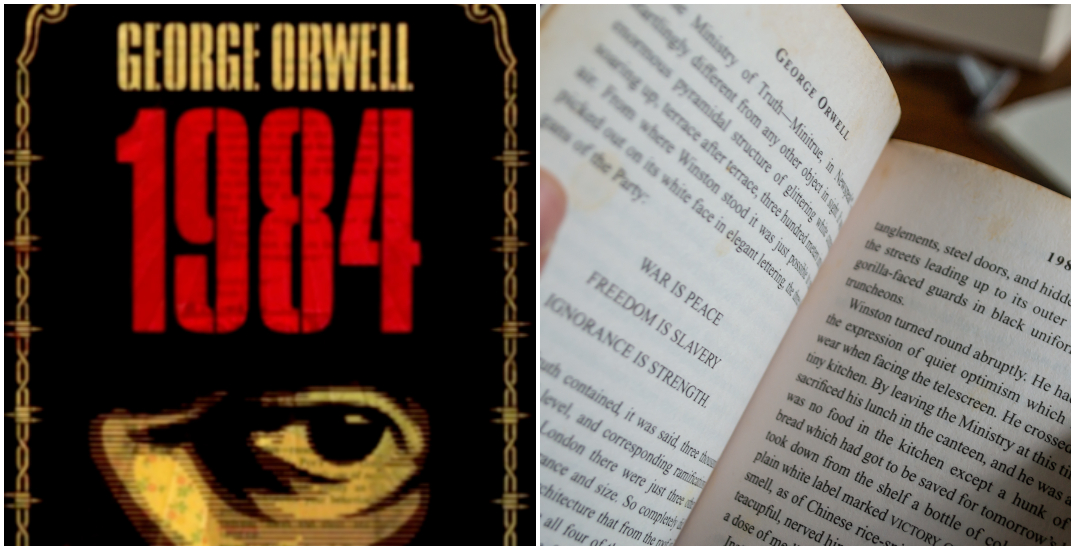In the world of literature, few works resonate with the potent urgency of George Orwell’s “1984.” Published in 1949, this dystopian novel serves as a prescient warning, depicting a society engulfed in totalitarianism, rampant surveillance, and a manipulation of truth. In “1984,” the narrative’s intricate layers are unfurled like a flower in an arid desert, revealing the chilling realities of a regime that thrives on ignorance and fear. This review delves deep into Orwell’s masterful construction of a bleak future, exploring its multifaceted themes, innovative use of metaphor, and its unsettling relevance in contemporary society.
At its core, “1984” is a haunting exploration of the human condition, examined through the eyes of Winston Smith, an everyman struggling to assert his individuality amidst an oppressive regime. The manipulation of language is one of the novel’s most striking themes, encapsulated in the concept of Newspeak—a manufactured dialect designed to limit the spectrum of thought. The irony that lies in language’s capacity to both liberate and imprison is astutely illustrated here, urging readers to ponder the power of words in shaping reality. The gradual erosion of meaningful discourse evokes an unsettling parallel with today’s world, where the potency of language is often diluted by sound bites and digital immediacy.
Orwell’s astute metaphor of the Party as an omnipresent deity mirrors the relentless grip that authoritarian regimes can impose on society. The Great Leader, Big Brother, whose face looms on posters throughout the fractured cityscape, embodies the invasive surveillance state. “Big Brother is Watching You” serves as a grim reminder of the perpetual watchfulness that characterizes totalitarianism. This notion prompts readers to interrogate the boundaries of personal freedom and privacy, especially in our era dominated by technology and social media. The idea that our lives can be scrutinized at any moment mirrors Orwell’s grim forewarning, echoing the pressing concerns surrounding contemporary data privacy.
Another integral element of “1984” lies within its exploration of history’s malleability. The Party’s slogan, “Who controls the past controls the future: who controls the present controls the past,” serves as a rallying cry for those wielding power. Orwell captivates the reader with the illustration of the “Memory Hole,” a device that obliterates inconvenient truths from existence, reinforcing the treacherousness of historical revisionism. This timely commentary poses a profound question: how do we discern truth in an age cluttered with alternative facts and competing narratives? The ability to manipulate history raises the specter of societal amnesia, a destructive force that, once triggered, can lead to the collapse of foundational democratic principles.
Winston’s rebellion against the Party is a poignant metaphor for the indomitable human spirit yearning for freedom. His clandestine love affair with Julia becomes an act of defiance, a fierce embrace of personal connection in a world that seeks to obliterate intimacy and emotions. The juxtaposition of their passionate encounters with the sterile environment of the Party is striking, revealing the resilience of human desire. Here, Orwell deftly explores the theme of love as a radical act, where moments of tenderness stand in stark contrast to an existence draped in despair. Such intimate experiences highlight the critical need for connection amid chaos, underscoring the human yearning for autonomy and the right to love freely.
Orwell’s portrayal of betrayal and its devastating consequences is another motif that demands contemplation. The novel’s harrowing conclusion serves as a bleak reminder of the cost of dissent. The insidious betrayal of trust, epitomized in Winston’s eventual surrender to the Party’s ideologies, paints a grim picture of the fragility of the human psyche when confronted with existential threats. As readers witness Winston’s transformation—from a man yearning for revolt to one utterly subjugated—the foreboding question arises: what does it mean to truly resist within a system designed to crush dissent? The tragedy of Winston’s capitulation invites readers to reflect upon the precarious nature of hope in the face of overwhelming oppression.
Central to the unique appeal of “1984” is its relevance in contemporary discourse. The novel resonates profoundly in modern society’s climate—a time riddled with escalating surveillance, social division, and disinformation. Orwell’s cautionary tale serves as a clarion call, urging vigilance against the encroachments of authoritarianism cloaked in the guise of security and progress. One might argue that the thematics of “1984” are not confined to the past; instead, they offer a lens through which we can critically analyze our present era. The stakes of apathy and complacency are rendered alarmingly clear, as complacency in the face of erosion of rights bears significant implications.
In conclusion, Orwell’s “1984” remains a monumental touchstone in literature and serves as an enduring reminder of the capacity for power to insidiously invade every aspect of human existence. Through its intricate metaphors and unflinching examination of themes like personal autonomy, privacy, and the malleability of truth, the novel implores readers to engage with their sociopolitical environments critically. As we navigate our intricate world, Orwell’s nuanced narrative continues to illuminate the shadows produced by authority, beckoning a collective vigilance necessary for safeguarding the future. Ultimately, “1984” stands not just as a historical artifact, but as a provocative exhortation that urges us to challenge the tenets of oppression, demand honesty in our narratives, and, above all, celebrate the undying spirit of freedom.
